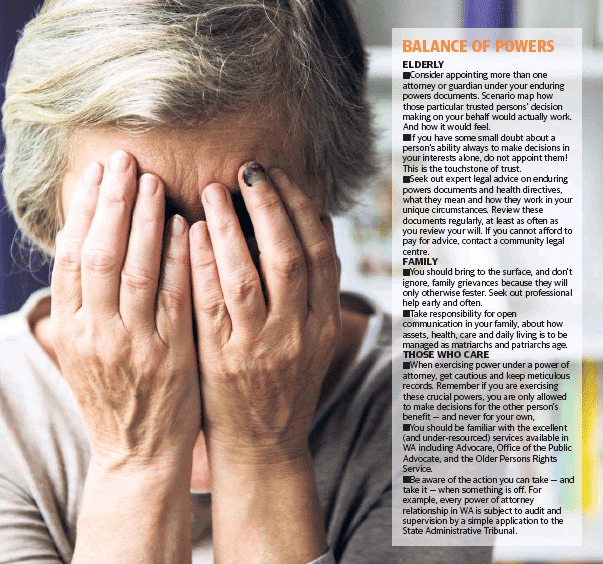There is an increase in cases involving aged people in varying stages of frailty, being manipulated or deceived, or just worn down, into making decisions that strip away their dignity, independence or financial status.
Or it might be that the disastrous financial decision isn’t theirs at all — it is made by, and for the benefit of, a relative or friend to whom they have entrusted everything and on whom they utterly depend.
It might be pressure or deception to sign a will or power of attorney, or being pressured to take out a loan, go guarantor or provide a mortgage. It could involve living free in a person’s property and refusing to contribute or leave.
Then there is controlling the bank account or access to cash or credit. And let’s not forget refusing to honour promises of long-term care once property and cash is given over.
It can often be after the point of no return and when there is nowhere else to turn that a lawyer is finally called in.
We’re asked to rescue a senior member of our community from losing their assets or savings, being frozen out of access to what is theirs, or being kicked out of the family business.
More commonly in the nick of time they are referred to us from concerned professionals — investment advisers, accountants, GPs, aged-care facilities and workers — who see that something is just not right.
Usually the victim doesn’t even know they are a victim. Or they refuse to believe it.
They may lack the ability to ask their loved ones for help, let alone instruct a lawyer. Too often, a broker or adviser of some sort has facilitated the disaster or turned a blind eye!
I’ve observed how easy it is for patterns of relationship involving ageing relatives and friends to move from well intentioned “helping” to “now I’ll help myself”.
Few believe it will happen to them or their family, but elder abuse is on the rise nationally as our population grows and ages.
Although hidden and unreported, the best estimates are some 5 per cent of the aged population nationally is subjected to some form of abuse or exploitation, mostly perpetrated by trusted family or friends.
Risk factors for perpetrators include substance abuse, depression, financial stress, and financial, emotional or relational dependence.
And that is a big part of the problem — the risk factors are little more than the ordinary lived reality of many, in these days of high household debt, high youth unemployment, addiction and growing mental health concerns.
The World Health Organisation’s definition of this complex social, psychological and legal phenomenon covers a multitude of everyday situations occurring in our homes, community groups, banks, farms, pubs and corner stores.
The definition says: “Any action or failure to act appropriately, which causes harm or distress to an older person and occurs within any relationship where is an expectation of trust.”
Each State has relevant laws, with varying degrees of effectiveness. What’s missing is a consistent, coherent national system.
There are increasing calls for national safeguards. The Australian Law Reform Commission launched its titled Elder Abuse — A National Legal Response on June 15, coinciding with World Elder Abuse Awareness Day.
It makes for jarring, and essential, reading. The 43 recommendations remain there for government action.
Notable proposals include a national, searchable register for key documents such as powers of attorney; compelling banks to take reasonable steps to prevent financial abuse; training for bank tellers; a serious incident response scheme.
Sensible reform which requires State and Federal co-operation.
FEW BELIEVE IT WILL HAPPEN TO THEM OR THEIR FAMILY, BUT ELDER ABUSE IS ON THE RISE NATIONALLY AS OUR POPULATION GROWS AND AGES.
Written by Murray Thornhill, Managing Director at HHG Legal Group.
*The information provided in this website serves as a general guide and does not constitute legal advice. It is based on our research and experience at the time of publication. Please consult our knowledgeable legal team for any specific inquiries or advice relevant to your circumstances, as the content may not have been updated subsequently.


